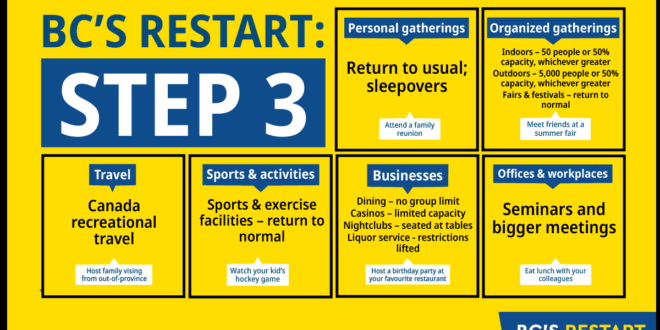WITH British Columbians achieving nearly 80% adult Dose 1 vaccine coverage and COVID-19 case counts continuing to decline, the Province announced on Tuesday that it is safely moving to Step 3 of its four-step restart plan on July 1.
“British Columbians have stepped up at every stage throughout this pandemic,” said Premier John Horgan. “We’ve helped our neighbours stay safe, we’ve sacrificed time with friends and family and we have diligently registered to get vaccinated. We’ve now reached a point in our vaccination efforts when we can begin to remove restrictions. Let’s continue to respect everyone’s comfort level as we safely take another step toward putting this pandemic behind us.”
Moving to Step 3 will signal the end to the longest provincial state of emergency in B.C.’s history. The emergency will be lifted on June 30 at 11:59 p.m.
B.C.’s public health emergency will remain in effect during Step 3 to support amended public health orders from the Provincial Health Officer (PHO) with reduced requirements.
During Step 3, businesses will gradually transition to new communicable disease plans, with guidelines for these plans released by WorkSafeBC on June 28. These guidelines were developed in consultation with public health and businesses will continue to be supported by WorkSafeBC and the PHO as they transition.
These plans will continue to include physical barriers at many business and retail settings. Capacity limits, formal health screening tests and directional arrows, as well as other physical distancing measures will no longer be required. However, they may still be used during this transition period.
“Step 3 is a major milestone for British Columbians,” said Ravi Kahlon, Minister of Jobs, Economic Recovery and Innovation. “We can now resume more of the activities and occasions we enjoy, workplaces and businesses will have more flexibility, and it opens the door for more economic activity as we transition into summer. We are able to take this step because of the work everyone is doing to keep themselves and each other safe.”
Moving from Step 2 to Step 3 also includes:
* return to normal for indoor and outdoor personal gatherings;
* maximum capacity for indoor organized gatherings of 50 people or up to 50% of a venue’s total capacity, whichever is greater;
* maximum capacity for outdoor organized gatherings of 5,000 people or up to 50% of a venue’s total capacity, whichever is greater;
* return to normal for fairs, festivals and trade shows, with communicable disease plans;
* return to Canada-wide recreational travel;
* reopening of casinos, with reduced capacity and ~50% of gaming stations permitted to open;
* reopening of nightclubs, with up to 10 people seated at tables, no socializing between tables and no dancing;
* return to normal hours for liquor service at restaurants, bars and pubs with table limits to be determined by venue and no socializing between tables;
* return to normal for sports and exercise facilities, with communicable disease plans; and
* mask wearing recommended in indoor public spaces for all people 12 and older who are not yet fully vaccinated.
Canadians travelling to B.C. from outside of the province are asked to plan ahead and be respectful while visiting communities, especially smaller and rural towns, as well as Indigenous communities – including respecting local travel advisories. For travel manners and guidelines to follow during summer trips and vacations – see travel manners under the Learn More section.
More than 250 meetings and discussions have taken place since the launch of BC’s Restart plan as part of government’s ongoing engagement, a majority being with industry organizations that represent thousands of employers and tens of thousands of employees. This includes an industry engagement table on new workplace safety guidelines, led by Kahlon.
The four-step restart plan was designed based on data and guidance from the public health team led by the BC Centre for Disease Control (BCCDC) and Dr. Bonnie Henry, Provincial Health Officer. Progressing to each step of the plan will be measured by the number of people vaccinated, COVID-19 case counts and hospitalizations and deaths and other key public health metrics.
“Because of the efforts of people in B.C., we continue to see a significant decline in new cases of COVID-19, hospitalizations and deaths as the number of people who are fully immunized goes up,” Henry said. “Public health teams throughout the province are closely watching the case data to ensure we maintain this positive momentum as we safely and gradually move into Step 3 of our Restart plan.”
Adrian Dix, Minister of Health, said: “Nearly 80% of eligible adults in B.C. have protected themselves, the people they love and their communities by getting vaccinated. I urge everyone to get fully vaccinated with two doses as soon as they are offered and continue this life-saving momentum.”
On July 10, 2020, the COVID-19 Related Measures Act came into force, enabling provisions created for citizens and businesses in response to the COVID-19 pandemic to continue as needed after the end of the provincial state of emergency. Under the provisions of this act, police and other enforcement officials will continue to be able to issue tickets for anyone who is contravening the Gatherings and Events or Food and Liquor Premises public health orders, which will remain in place. This includes fines for people who are being abusive or belligerent about the requirements of public health orders.
 Desi Today Magazine
Desi Today Magazine




